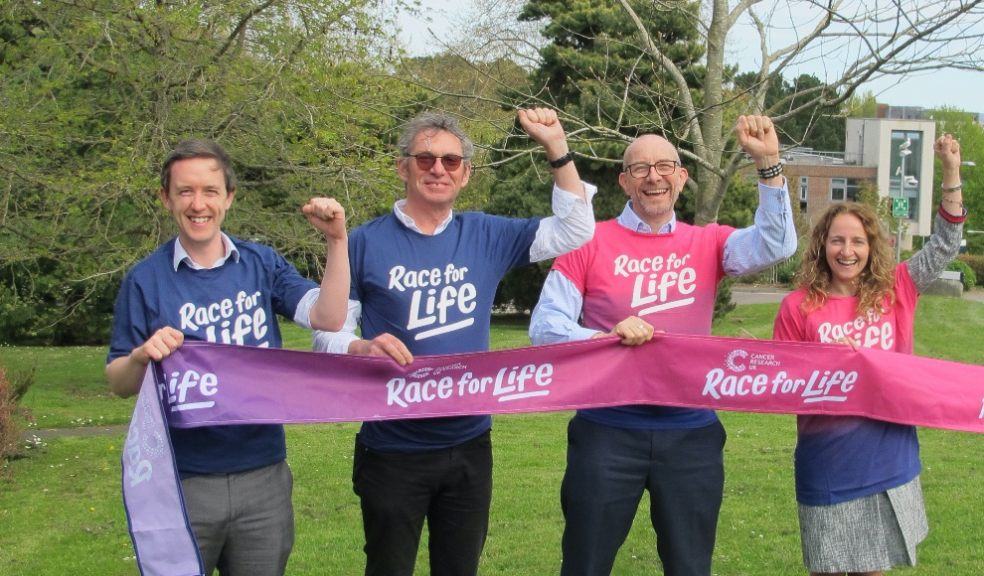
Let there be light! Exeter Scientists urging us to Race for Life
This group of researchers from Devon are leading the way in transforming how cancers are detected and treated by harnessing the power of light.
The team, who receive funding through Cancer Research UK, are encouraging people to take part in Race for Life this summer and help fund more life-saving research.
Their innovative use of Raman Spectroscopy, which is based upon the interaction of light with the chemical bonds within a material, is forging a better understanding of treating cancers earlier.
Some of their work centres on patients with oesophageal cancer. A disease which has a poor survival rate – with the condition more common in men than women, but thanks to pioneering technology created by scientists, the future is looking brighter.
Professor Francesca Palombo, (pictured) is using imaging microscope technology called a Brillouin microscope. This uses only light, where the technology is able to detect microscopic changes in the physical and chemical characteristics of the cells lining the oesophagus, which may indicate the early signs of cancer, enabling the disease to be picked up earlier.
Every year around 36,800 people are diagnosed with cancer in the South West of England *. Money raised at Race for Life enables scientists to find new ways to prevent, diagnose and treat cancer - moving closer to a world where everyone can live longer, better lives free from the fear of the disease.
The Race for Life events in Exeter take place on Saturday 20 July at Westpoint and are open to all ages and abilities. People can choose from 3k, 5k and 10k events. There is also a chance to take part in Pretty Muddy, a 5k mud-splattered obstacle course, and there’s a Pretty Muddy Kids option on the same day.
Prof Palombo, who is based at the University of Exeter, said: “I’d like to thank everyone across Devon who supports Race for Life.
“Vital work is underway to prevent, diagnose and treat more than 200 types of cancer. The funds raised already help people living with cancer every single day and will make a difference for future generations.”
“The way the Brillouin microscope works is by using spectroscopy – light photons interact with sound waves in tissue and produce scattered light signals that are processed to examine biomechanical changes in patients - all in a non-invasive contact-less way.”
Meanwhile, Mr Thomas Hubbard, who is an Honorary Breast Registrar at Royal Devon and Exeter Hospital, specialising in surgery. His current research lies in the use of Raman Spectroscopy to assist in his work of breast conserving surgery.
Cancer Research UK’s Race for Life, in partnership with headline sponsor Standard Life, part of Phoenix Group, raises millions of pounds every year across the UK to help beat cancer by funding crucial research.
Alison Birkett, Cancer Research UK’s spokesperson in Devon, said: “We are grateful to all the team here in Exeter for their support.
“No matter how cancer affects us, life is worth racing for. Sadly nearly 1 in 2 of us will get cancer in our lifetime.** Race for Life has the power not only to transform lives, but to save them. We’re proud that Race for Life has already helped double survival rates in the UK.
"We’d love for as many people as possible across The South West and beyond to join us at Race for Life. It’s a fun and achievable challenge for everyone and we mean everyone. Walk, jog, run or take on the course however it suits best. It’s a chance to feel the power of moving together with fellow Race for Lifers and have fun with it.
“Whether people are living with cancer, taking part in honour of or in memory of a loved one with cancer, in it for the medals or just for the fun of fundraising, there is a place for everyone.”
Since it began in 1994, more than 10 million people have taken part in Race for Life, funding 30 years of hope and progress. Money raised has helped develop radiotherapy which benefits more than 130,000 people with cancer in the UK every year. Cancer Research UK funded scientists led the development of the Human Papillomavirus Virus vaccine, which is expected to prevent almost 90 per cent of cervical cancers in the UK. The charity also funded many large clinical trials looking at the effectiveness of the drug tamoxifen and the research shaped the way the drug is used to treat breast cancer today.
Andy Curran, Chief Executive of Standard Life, part of Phoenix Group, said: “We are incredibly proud to continue as headline sponsor for Cancer Research UK’s Race for Life, with the opportunity to encourage participation across the country.
“By working to raise funds for life-saving research, we can move towards a future where people live longer and healthier lives, free of cancer.”
To enter, visit raceforlife.org .

















